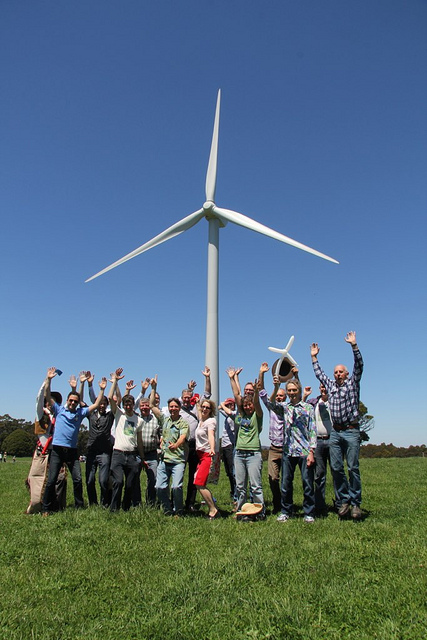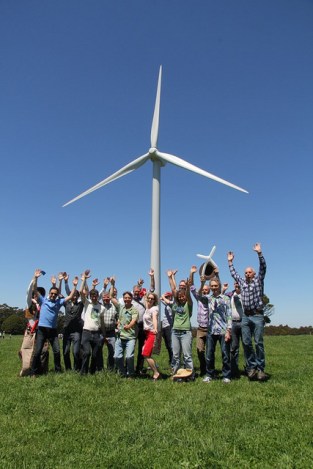We join together with our fellow humans for the sake of saving a buck all the time. That’s why public transportation exists — it’s cheaper for 20 people to get on one bus than it is for 20 people to drive their own cars. (Oh right, and buses are also super cool.) Or think of roommates — sure, they never wash their dishes, but living with them saves us hundreds of dollars in rent.
Groundswell, a nonprofit in Washington, D.C., wants to add clean electricity to the list of things that are better off shared.
Groundswell was founded by three guys who worked on President Obama’s campaign in 2008. “They had really seen the impact of community organizing in a political space,” says Elizabeth Lindsey, the group’s managing director. “And after the campaign, they were really interested in seeing how you could take that model and make a tangible difference outside the political sphere.”
To do this, Groundswell helps communities leverage their collective purchasing power to win the best possible deals on clean energy. They bring together nonprofits, community groups, churches, or individuals to make bulk purchases of wind-powered electricity, for example, or energy efficiency upgrades on homes and buildings. Buying as a group allows them to negotiate lower prices, and could potentially make this type of service available in areas where individuals and solitary community groups cannot afford it alone.
Reverend Tom Knoll of First Trinity Lutheran Church says his congregation saved $6,000 in a year by partnering with other Washington, D.C., churches to buy wind power. The church plowed the savings into charitable programs such as a food pantry, low-income housing, and job training programs. An added bonus was getting to know other churches, he says: “We don’t normally talk to one another, even though we may all be Christian.”
Lindsey, who worked in green workforce development before joining Groundswell, was attracted by the organization’s emphasis on job creation. “There were often government programs or nonprofit programs that were paying for training programs, but there weren’t necessarily jobs available for these individuals once the training had occurred,” she says. “When I first heard about Groundswell, I was really impressed by the fact that they were looking at the other side of the equation — not just, like, ‘We need to train people,’ but ‘How can we actually build a clean economy where jobs are actually created?’”
Lindsey also notes that together, groups can make demands that align with their values — like insisting on only working with contractors who provide health care for their employees or hire local residents or unemployed workers. “Because these groups are working together, they’re able to build in different social outcomes that they’d like to see,” she says.
But bringing clean energy to poor communities has been a challenge for the group. Although Groundswell does work in some underserved communities in D.C. and Maryland, even buying in bulk, costs can be prohibitive. “It’s expensive to get your home weatherized, and quite honestly, a lot of low-income communities can’t afford it,” Lindsey says.
Still, over time, Groundswell’s model of empowering communities may provide the missing link in the clean economy: consumer demand. Like the organization’s name, Lindsey says, “it’s a wave that builds over time. If you have one person, it’s great. But if you have five people, 10 people — we’re really building these powerful groups of consumers together.”




